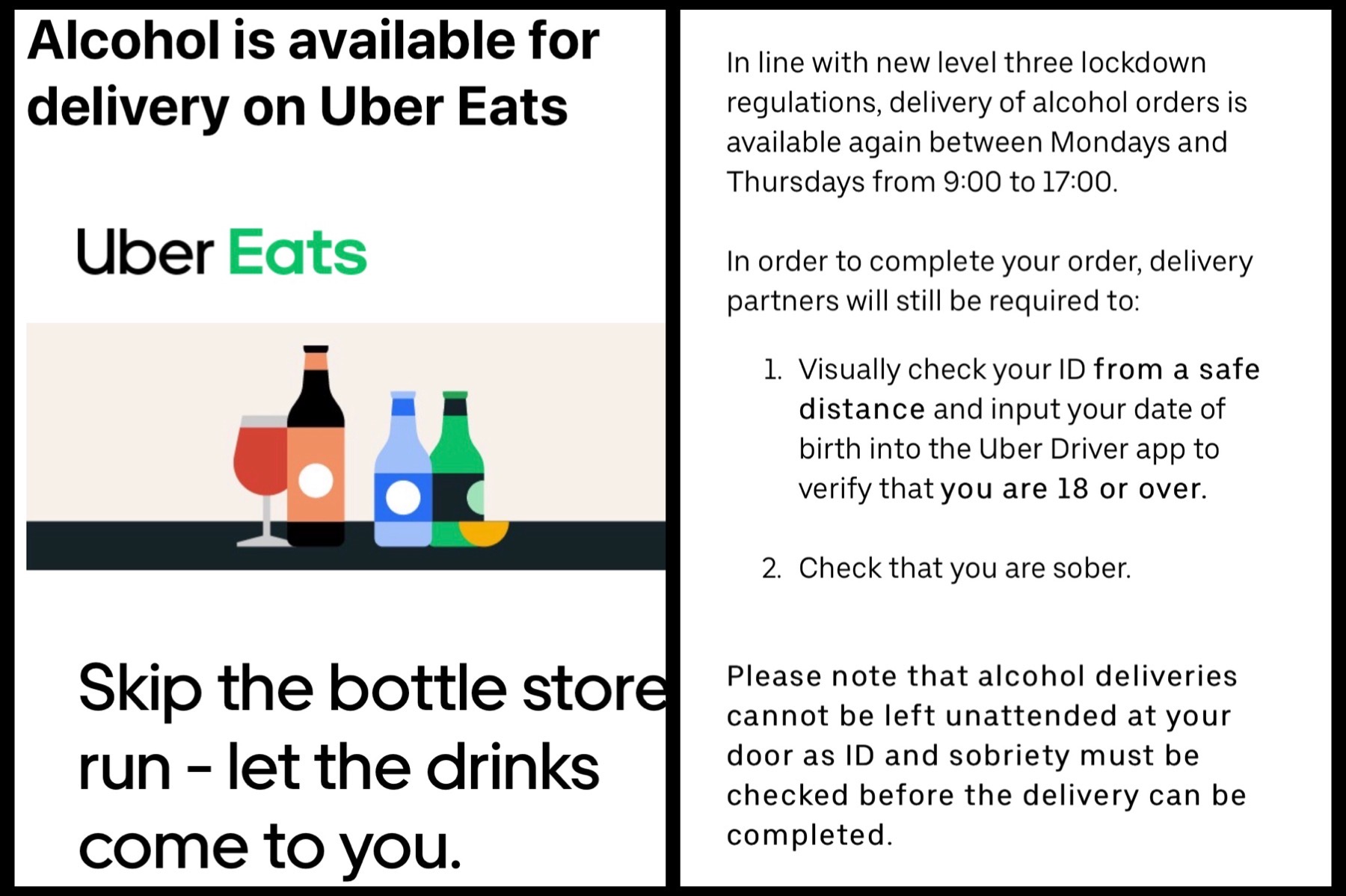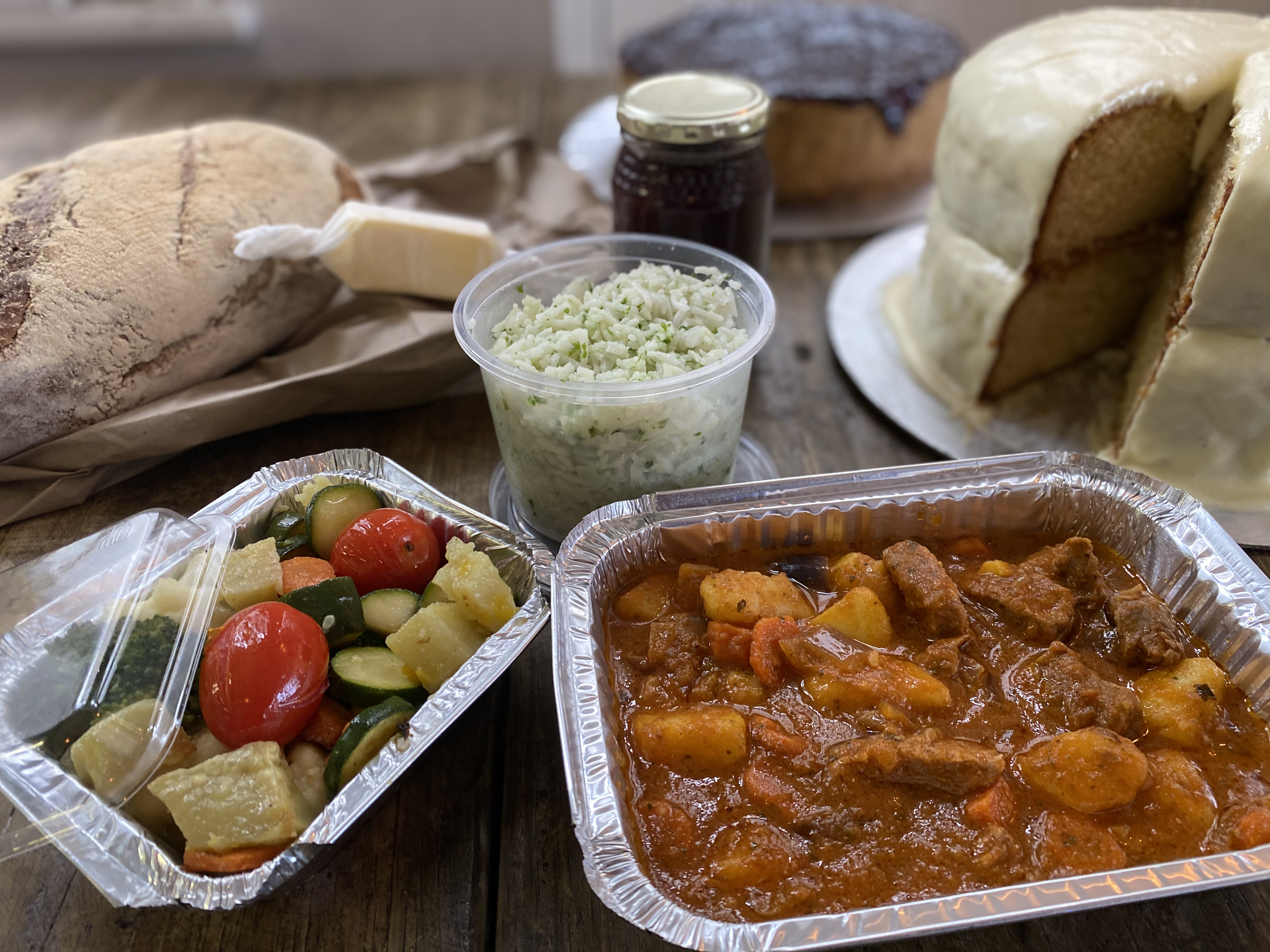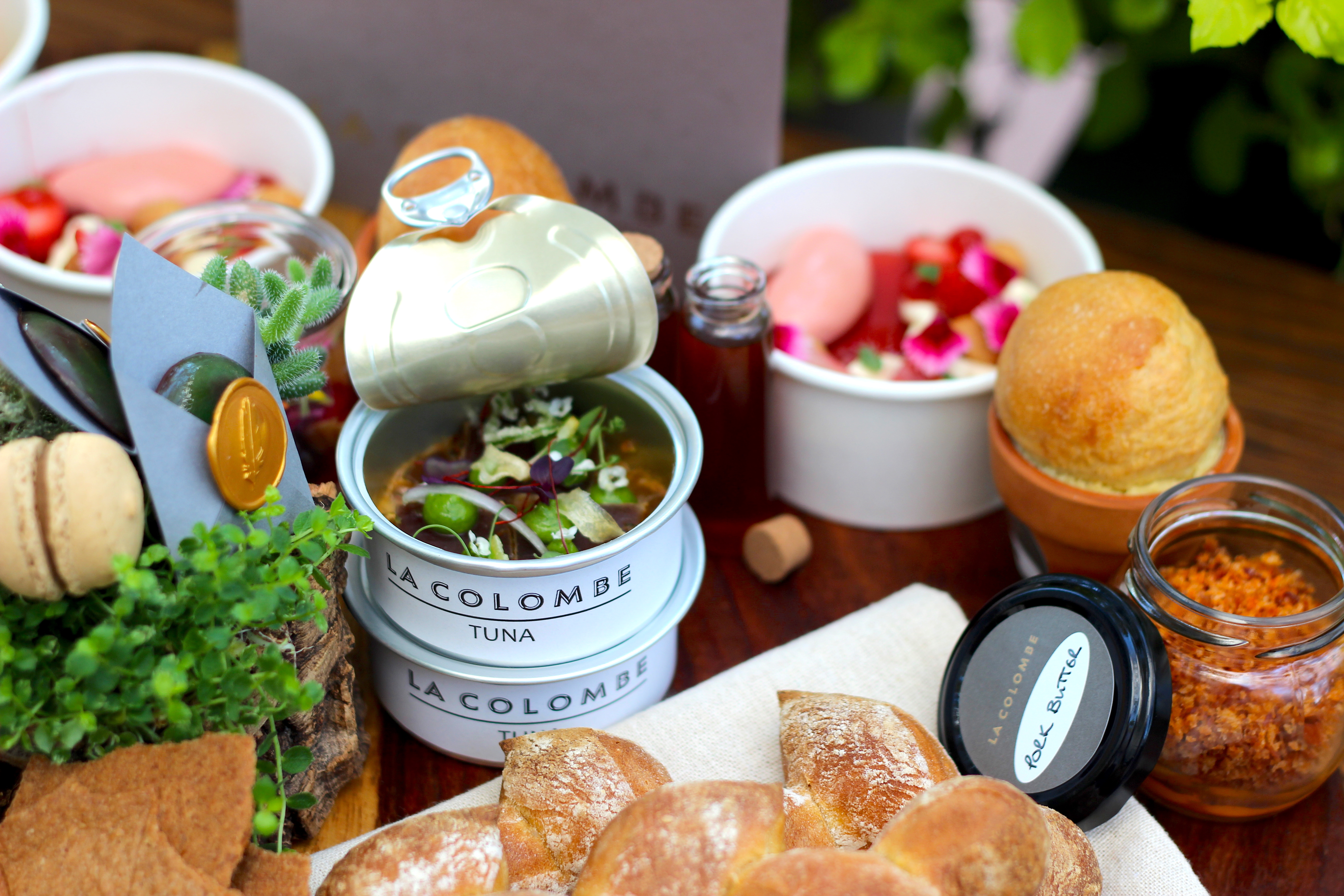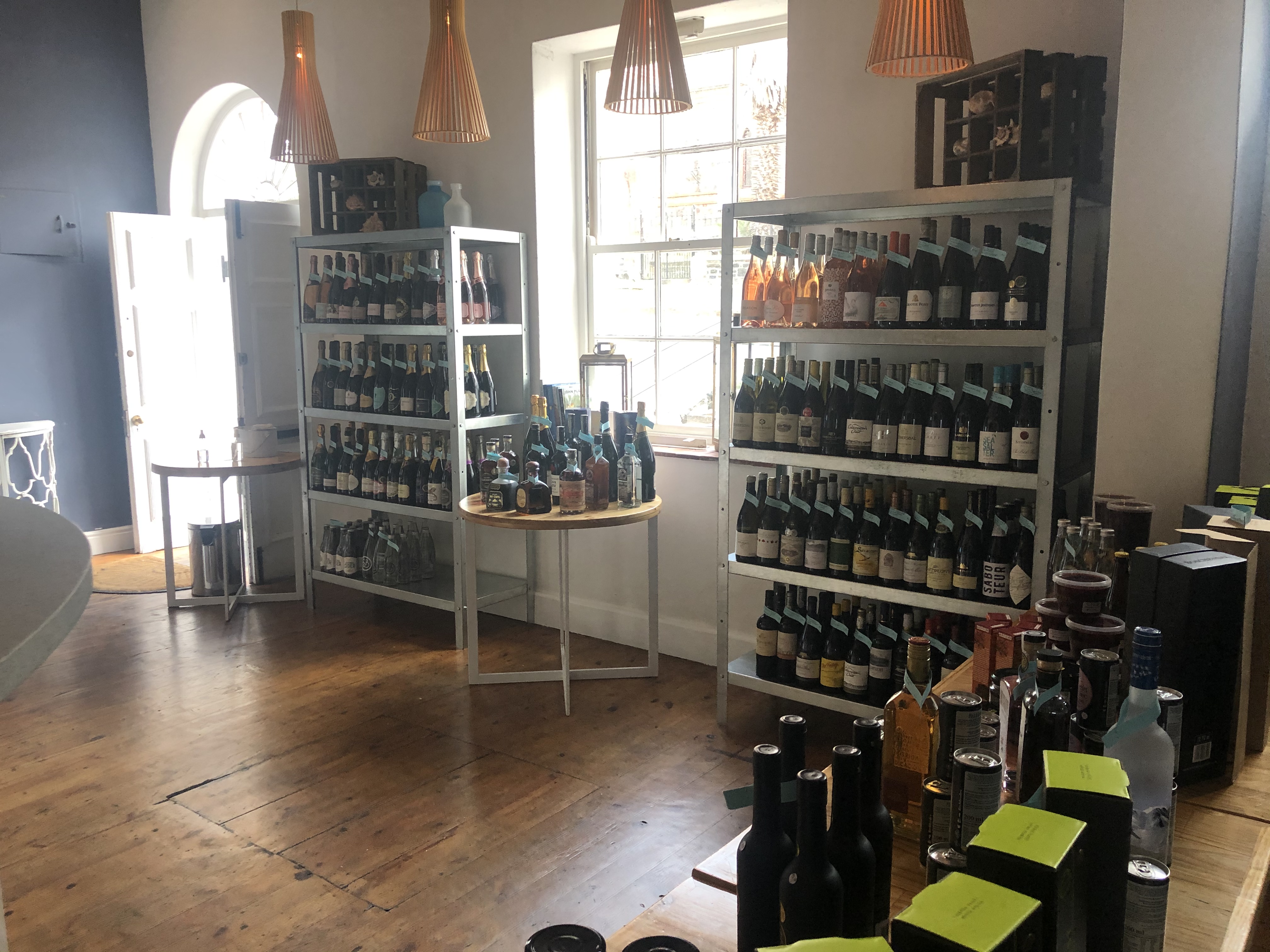LIQUOR LEVELS
So the lockdown hooch regulations have changed. Now what?

Consumers and restaurateurs alike heaved a collective sigh of relief as the Level 3 lockdown regulations allowed for the delivery or collection of alcohol – with or without a food order.
As South Africans joked they had reached Level 3 in the worst game in the universe on 1 June, 2020, and unlocked alcohol, queues outside bottle stores snaked around blocks that Monday morning. The wise (dare we say, evolved; no one is the same person they were two months ago…), who preferred to maintain their social distance or had no patience for standing in line – as festive as it was in some places – had pre-ordered online for delivery, or made use of liquor delivery services.
The bonus for consumers, as well as stricken restaurateurs all over the country who are in possession of liquor licences, was the Hail Mary that they too can now sell alcohol for delivery or collection. The collective sigh of relief was audible.
During the past 71 days and counting, the industry has been on a roller coaster ride, from having to reduce seating to allow for physical distancing and not sell alcohol after 6pm, to not being able to trade at all, and then later being allowed to do deliveries. In Level 3, restaurants can deliver as well as allow for collection drive-bys. With the addition of a bottle of wine, a few beers, or spirits to an early dinner order, a whole new world has opened up. Delis and cafes are now also wine shops, some places are just flat out trading as bottle stores, clearing stock which has been gathering dust since the end of March.
It was also time for the booze delivery apps to get back to work. Although it’s been doing food deliveries, with the new freedom for restaurants to peddle their liquid wares, Uber Eats was first out of the gate on Monday morning, with an email to its users.
Skip the bottle store run – let the drinks come to you, read the headline. So far, so good.
In line with new Level 3 lockdown regulations, delivery of alcohol orders is available again between Mondays and Thursdays from 9am to 5pm, it continued.
Still good.
But then things got weird. “In order to complete your order, delivery partners will still be required to 1) Visually check your ID from a safe distance and input your date of birth into the Uber Driver app to verify that you are 18 or over, and 2) Check that you are sober.”
The mailer concluded by saying “alcohol deliveries cannot be left unattended at your door as ID and sobriety must be checked before the delivery can be completed”.

A screenshot of the email sent to users by Uber Eats. (Photo: Supplied)
Of course, the over-18 rule is one we all know (and many of us have broken in our wild youth, but that’s another story). But we have to be sober to get our vodka? What if we made merry, ran out, and needed more? The Uber Eats delivery person is going to check this how, exactly? Especially with that magical phrase “physical distancing” still firmly in place. Is the Uber Eats driver permitted by law to enforce this and if so, on what grounds? Are we at the mercy of the judgement of this driver, who will determine by some mysterious means that we are too drunk to drink?
Although not leaving the delivery unattended is something I endorse (I’m not stupid), I am flummoxed by this condition of delivery. I asked the company to comment.
“We want the Uber Eats app to be an enjoyable experience for everyone, ensuring that safety precautions and mutual respect is maintained at all times,” said a spokesperson for Uber Eats.
“As part of our Community Guidelines, you must be at least 18 years old to have an Uber and Uber Eats account. It is also noted that delivering alcohol to consumers under the local legal drinking age is prohibited. Couriers have always been asked to check identification as well as intoxication, ensuring Uber Eats is a responsible platform.
“Uber has issued information and guidance which include helpful tips to ensure they follow the social distancing measures.”
🍽 🍽 🍽
At the beginning of May, 2020, Quench re-engineered its app from an alcohol to a same-day grocery delivery service – specifically Woolworths – and saw a significant spike in downloads and new active users since the launch of the new service. Naturally, there is now a return to its original purpose. The grocery spike had nothing on the alcohol spike: a whopping 560% increase in app downloads, said CEO and co-founder, Liam McCreedy.
“We always adhere to age regulations,” he continued. “When you download the app you are required to enter your age, to ensure you are over 18 years old. Our drivers request ID on delivery to ensure it matches that of the name on the order being delivered.”
But what about their sobriety? “It is not within our jurisdiction to ask the customer if they are under the influence or anything that might make reference to their personal state of mind,” said McCreedy.
🍽 🍽 🍽
Charmaine Lilje of Dalebrook Café in Kalk Bay, said her first thoughts upon hearing she could sell alcohol was that prices needed to be looked at so they are feasible, and the selection must either be standard or interesting. “We have always worked on a lower mark-up than normal and continue to do so,” she said.
“We have on our website that alcohol is only sold to people over the age of 18. We do our own deliveries so our driver knows to ask for ID, and in-store we can ask for ID.” As for whether the customer will be refused delivery if deemed tipsy, Lilje responded firmly: “Absolutely not. Everyone is entitled to make their own decisions.”

‘We are loving our existing farmstall/deli growth and how the product ranges have changed during lockdown,’ says Charmaine Lilje from Dalebrook Café in Kalk Bay. (Photo: Supplied)
There’s been a great response from customers so far (no surprises there), says Lilje, who also owns Chardonnay Deli in Constantia (which doesn’t have a liquor licence). “More people are enjoying coming into the store, as opposed to online shopping now,” she said.
“We are loving our existing farmstall/deli growth and how the product ranges have changed during lockdown. It has been fun learning about our customers in a different way, and what their needs are for day-to-day-shopping.
“The deli has developed so much and it will be incredible to open our doors to normal restaurant trade again while complementing our existing farmstall/deli (which is so fabulous).”
🍽 🍽 🍽
Upon hearing the news about alcohol sales, Peter Weetman, owner of Societi Bistro in the Cape Town City Bowl, said he was very excited. “I think each opportunity given must be assessed and if it works for you, embrace it. I had heard an interview on Cape Talk earlier that week that the suggestion had been made to the government by the liquor industry, to decrease the congestion by increasing the points of sale,” he said.
The restaurant adheres to all off-consumption regulations on its website for kerbside collection and deliveries. “Most of our deliveries are via a third party like Uber Eats and Mr D Food,” said Weetman. “For kerbside collections, the order is placed on our website, the guest notifies us of their arrival telephonically, and a staff member (fully Covid-19 hygiene compliant) delivers the alcohol and food into the vehicle.”
It’s abundantly clear that businesses have been suffering during lockdown, and many have had to adapt to the new reality to cling onto survival by their fingernails. Restaurants (as well as clubs and bars) have a more or less standard markup on liquor retail prices. Sure, some are ridiculous, but never mind them right now. It’s all well and good to be able to sell your Chardonnay to grateful customers, but at what price?
“We have to look to best practice in the retail sector, and adjust our margins accordingly – there is a balance with fewer staff, higher volumes, and far less time spent,” said Weetman.
At Societi Bistro too, there has been a great response to the service. “Our safety levels are particularly high – with even payments only being digital, our location is central and the process is seamless, friendly and hygienic,” said Weetman, who predicts that the next three years are going to be spent adapting, innovating, and recovering.
“Survival has been challenging, but the loyalty of our guests has been remarkable, and we remain cautiously optimistic about the future, and are excited to explore new opportunities going forward.”
🍽 🍽 🍽
Less than two weeks ago, at the end of May, 2020, top South African restaurant La Colombe launched its Dine-In Experience, consisting of a nine-course fine-dining menu, carefully crafted to be enjoyed at home. Since alcohol sales are forbidden after 5pm, and this spectacular dinner is generally going out after that, La Colombe is not doing wine deliveries.
“But we are currently setting up a wine shop at Foxcroft where we will be selling the premium wines from our larger group restaurants – including La Colombe, La Petite Colombe, Protégé and Epice,” said Scot Kirton, chef proprietor. “At the moment, our strategy is to sell any existing stock we have at cost price, with a small mark up going towards helping our staff during this time.

The La Colombe Dine-In Experience is a nine-course fine-dining menu to be enjoyed at home. (Photo: Supplied)
“The new alcohol takeaway allowance is good news for restaurants and the greater industry. We may look at an earlier meal option and include the option of alcohol down the line.”
Restaurants are in a terrible state, with staff suffering the most, said Kirton. “All profits from our La Colombe Dine-In Experience are going towards trying to keep our staff afloat – a daunting task when you have over 300 team members, as we currently do. We are going to release additional at-home dining packages in order to involve as many staff as possible during this period, until sit-down is allowed again and we can attempt to pick up the pieces – and start again.”
🍽 🍽 🍽
Something else to consider, when deciding whether to buy your wine from a retail chain or a restaurant, is that restaurants more often than not have carefully curated wine lists, featuring special wines not normally available in shops, or only from the cellar door. Seabreeze Fish & Shell, in Bree Street, Cape Town for example.
“This was a game changer for us as we had a good stock of wine that was sitting in storage that we were considering having to return to our wine suppliers. We hope this can keep us going,” said Ruth Grahame, co-owner with her husband Alex.

The selection of wines, MCCs and sparkling wines at Seabreeze Fish & Shell. (Photo: Supplied)
“We encourage everyone to order online at our online shop to avoid/limit contact with customers. We set this up when we were allowed to do food sales for essential goods as we sell fresh fish and shellfish. For deliveries, we do it ourselves with our own transport and one member of our team assists. For collections we have the order prepared in advance and it is picked up by the customer.”
Grahame laughs at the notion of turning a profit on these wine sales. “We’ll be happy just to survive!” she said. “We are selling our wine at retail pricing, to compete with shops. We have excellent relationships with our customer base, so we know and understand what they like and what they are looking for.
“We stock several wines not available in the shops. We also have the most comprehensive list of South African Cap Classique/MCCs and sparkling wines in the Western Cape on offer, which have all been hand selected by myself and Alex, as have all our wines.”
Keeping restaurants alive is tough – very tough, says Grahame. “There have been some casualties and that is heart wrenching. We are in touch with so many chefs, restaurateurs, colleagues in the tourism sector, hoteliers, wine producers. Some of the charitable initiatives undertaken have been incredible.
“Collectively, we employ thousands of people who become our family, who provide hospitality unlike any other in the world. We all have our employees and their families to think about. The UIF situation has been distressing as it’s taking so long but now after two months it seems to be getting somewhere. We just want our team to have the money due to them.
“There are so many of us independents in Cape Town and we’ve had many sleepless nights. We are the entrepreneurs who have made this beautiful city sparkle and we are part of the reason millions of people visit this city every year and also return time and time again.
“Day by day we are trying to keep our business alive by doing what we can and adapting as new regulations are announced.
“We hope that consideration will be made by the government to come up with realistic regulations for the hospitality sector. Our margins are very tight in the restaurant sector. Consultation, negotiation and relationships will be the focus for us to see a way forward in the new normal. The property industry has to understand and adapt – if landlords want their units occupied.”
🍽 🍽 🍽
Yet another thing to keep in mind in these wild crazy days of having drinks delivered to your doorstep, is the time of day, as Kirton mentioned. Botanicum in Constantia has been delivering its scrumptious sourdough pizzas for a couple of weeks now, and has just introduced its winter special of two pizzas and a bottle of house red for R260. A fabulous deal but a logistical nightmare as customers aren’t going to be able to have both at the same time unless they do some proper planning upfront. They can place their order, pick up the wine before 5pm, and have the pizzas delivered later, for example.

Botanicum’s famous two pizza and a bottle of house red special requires precise planning to be enjoyed under the current regulations. (Photo: Supplied)
Owner Marc Botes said he didn’t see this new regulation coming but is pleasantly surprised. “I didn’t think they’d be so forward thinking and progressive. I think it’s designed to help restaurants liquidate their stock,” laughing at his own pun. He’d like to know how long the amendment will be in play, however, so he can strategise.
Botes’s contacts in the wine industry mean he has often had the opportunity to nab exceptional wines at great prices, which puts him in a fairly favourable position right now.
“We can’t compete with the big guys, and it’s no good making big turnover if the margin is too low.” Botanicum is offering a voucher for a free pizza (terms and conditions apply) if you buy a case or more, and prices can be about 10 to 15 % lower than other places, said Botes.
“We haven’t sold a lot but it’s a bit of cash flow. Relying only on takeaways just doesn’t add up for restaurants. We are desperate to get people back in the restaurant. This is a nice new angle, and it’s better than nothing.
“What people need to do is support local. If they can do that – and I hope they do – that’s going to help. That’s all we can ask: support the restaurants in your area and maybe we can get through it.”
🍽 🍽 🍽
“Put up a sober face to your Uber Eats delivery driver!” said advocate Theo Nel, who is also the owner of the Karoo Art Hotel in Barrydale, “as the driver can reverse the sale upon delivery if you appear drunk to him!”
The statutory requirements in terms of the National or the Provincial Liquor Acts, prohibit any liquor licence holder (bar/restaurant/off-sales liquor store) to sell liquor to a person visibly under the influence of alcohol, explained Nel.
“During the Covid-19 lockdown period from Level 3 and down, a unique dispensation was created by the Government’s C19 Regulations, also allowing licensed premises that normally are only allowed to sell on-site to patrons at a bar or restaurant, to also temporarily become an off-sales – allowed to sell liquor for take-away purposes – something that is normally prohibited. None of these liquor licence holders are allowed to sell liquor to anyone that stumbles in there, visibly drunk. If they do so, they transgress the liquor laws and commit a criminal offence – and can be given a heavy fine or, in cases of repeat offenders, may even lead to the revocation of their liquor licence.”
Nel expressed reservations on the legality of the Level 3 Covid-19 regulations overriding the prescripts of the Liquor Acts – something introduced predominantly to appease shebeen owners prohibited until the Level 3 regulations to trade in terms of the lockdown regulations.
“But until that is set aside by a court, you can now go there and pick up your liquor for take away (you may not drink it on site) and the same rule applies – if you’re visibly drunk, they cannot sell to you.”
Where does this leave food delivery services like Uber Eats, when they deliver alcohol? Nel said that in doing so they act as an agent on behalf of the holder of the liquor licence, and its partner drivers, in turn, act on behalf of Uber Eats.
“As representatives of the holder of the licence, they are under the legal obligation to make sure upon delivery that the transaction is indeed a legal one in terms of the liquor laws – such as only selling liquor between the hours allowed, and only to buyers of majority age (adults – persons over 18 years) and only to buyers who are not visibly intoxicated.
“The liquor laws place a legal duty on the delivery driver to ensure the buyer is 18 years or older and to make a judgment call at the delivery stage on whether the buyer is not drunk and whether delivery can take place or not. The transaction will already have been completed earlier through the online app. At the time the sale is processed online, Uber Eats of course cannot form any opinion about the sobriety of the customer.”
What happens if the Uber Eats driver at the time of delivery can see that the buyer is patently drunk? “Just as the driver needs to ensure at the moment of delivery that the buyer is not a minor (younger than 18) – by checking the buyer’s ID in cases of doubt – such driver must make a robust assessment of the sobriety of the buyer and refuse delivery if the customer is visibly drunk, return the items to the supplier, and reverse the payment for the liquor. Arguably, Uber Eats can still charge their delivery fee for the reversed transaction,” said Nel.
“Another view is that the purpose of the prohibition to sell liquor to a drunk person is to avoid public drunkenness and the spectacle or trouble that can be caused thereby. If you are drunk in your own house, it can be argued that the prohibition does not apply.
“Big Brother only regulates your behaviour in your own house in cases where the law would be contravened. You are allowed to get drunk at home. But you are not allowed to, for instance, assault someone at home – that remains an offence. It can be argued that the law prohibiting the sale of alcohol to drunk buyers was never meant to apply to the drunk buyer ordering from home. However, I have little doubt that this interpretation will not find favour with the liquor authorities or the police,” concluded Nel. DM/TGIFood





 Become an Insider
Become an Insider